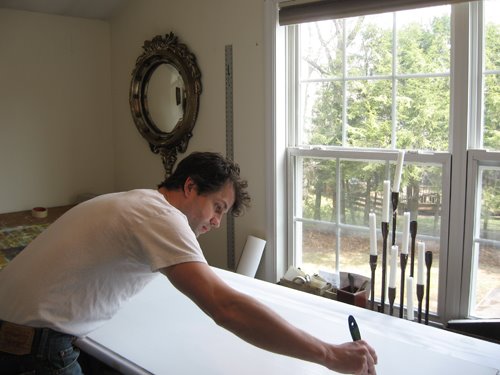 Here is a painting by Courbet that is being used to advertise his show at The Met. I am going to see his show on Sunday. I am not working--I am going to Met. This painting is called "The Desperate Man." I would change title to "the artist known as Alex" or "deadlines." or "I have to make six glass pieces by when????" I own a journal of Courbets (not an original) but a published journal.
Here is a painting by Courbet that is being used to advertise his show at The Met. I am going to see his show on Sunday. I am not working--I am going to Met. This painting is called "The Desperate Man." I would change title to "the artist known as Alex" or "deadlines." or "I have to make six glass pieces by when????" I own a journal of Courbets (not an original) but a published journal.here is something I stole from the Mets website....
Gustave Courbet (1819–1877), the self-proclaimed "proudest and most arrogant man in France," created a sensation at the Salon of 1850–51 when he exhibited a group of paintings set in his native Ornans, a village in eastern France. These works challenged convention by rendering scenes from daily life in an emphatically realistic style and on the large scale previously reserved for history painting.
Courbet's career was punctuated by a succession of scandals, which were usually cultivated by the artist and always welcomed. After a public fight with the all-powerful superintendent of fine arts, Comte Nieuwerkerke, several of his works were refused display in the great Salon and Universal Exposition of 1855. Courbet countered with his own Pavilion of Realism, audaciously built within sight of the official Salon, where he exhibited, among other works, a monumental canvas, The Painter's Studio (Musée d'Orsay, Paris). The accompanying exhibition catalogue included his "Realist Manifesto," in which he declared his aim "to be in a position to translate the customs, the ideas, the appearance of my epoch, according to my own estimation." The press had a field day, and Courbet immediately became the most controversial artist in France.
A new generation of painters, among them Manet, Monet, Fantin-Latour, Degas, and Whistler, were drawn to Courbet's outsize personality and his realism. As a painter of landscapes, he developed a radical vision, expressed in tightly focused views of his native Franche-Comté as well as his "landscapes of the sea," which profoundly influenced the next generation of artists, especially Cézanne.
In 1870, he rejected the coveted award of the Legion of Honor, proclaiming his freedom and independence from any form of government. His involvement with the short-lived, socialist government, the Paris Commune of 1871, led to imprisonment and, ultimately, self-imposed exile in Switzerland, where he died in 1877. Through his powerful and idiosyncratic realism and his courtship of the press and controversy, Courbet became a pioneering figure in the history of modern art. His paintings, which moved Picasso,




No comments:
Post a Comment